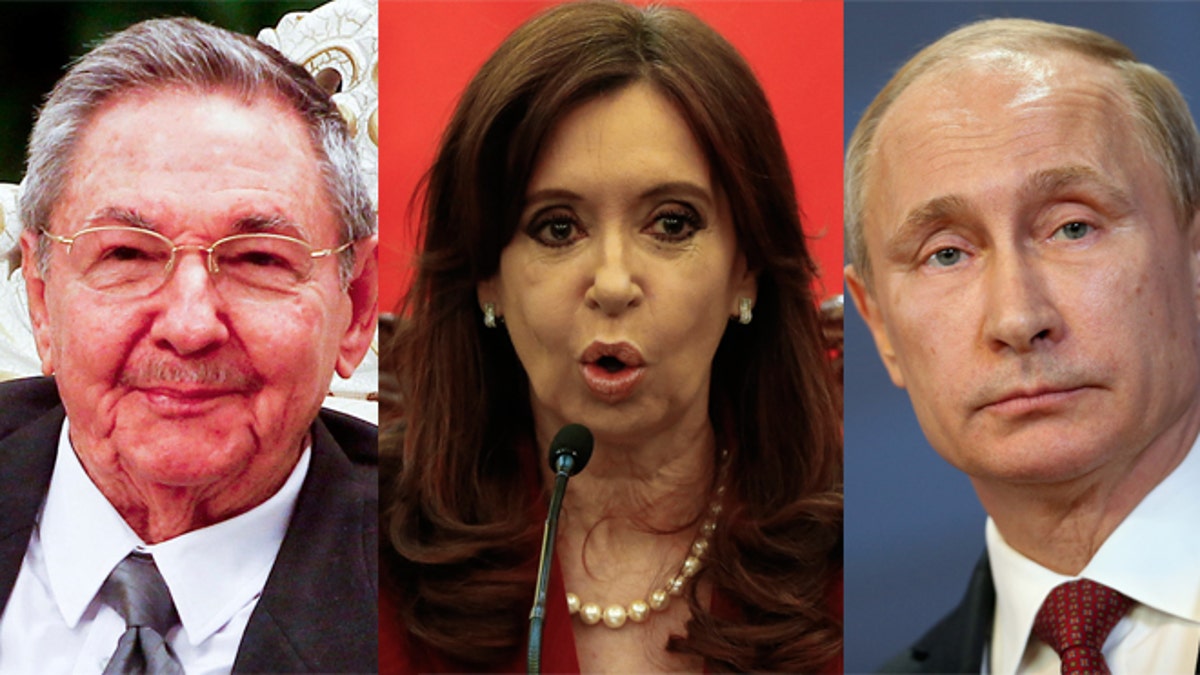
Frequent visits to the region by high-ranking Russian officials – culminating this week with a four-nation trip by Foreign Minister Serguei Lavrov – and rumors of the sale of military aircraft to countries like Argentina and Nicaragua have led to widespread speculation about Moscow's increasing role in Latin America and what this means for relations between the United States and its neighbors in the Western Hemisphere.
With pressure from many Western nations over its role in the Crimea and heavy sanctions from the U.S., Lavrov's trip to Cuba, Colombia, Guatemala and Nicaragua is seen by many as both a move to gain support from countries traditionally opposed to Washington's influence in Latin America and a way to ruffle the feathers of U.S. lawmakers concerned about Russia's foray into the U.S.'s traditional sphere of influence – especially as U.S.-Russian relations continue to plummet.
"U.S.-Russian relations are at a low that we could not have expected at the end of the Cold War," Jason Marczak, the deputy director at Atlantic Council's Adrienne Arsht Latin America Center, told Fox News Latino. "Russia doesn't really have the ability right now to have a real presence in Latin America, but they can spark concern in Washington that Russia is on the rise in the region."
While most observers agree that Russia's moves into Latin America won't create the geopolitical uproar that it could during the height of the Cold War, there are concerns that its influence could create problems for the U.S.'s policies in the region.
During his stops in Cuba and Colombia, Lavrov was quoted as saying that Russia will work with Cuba to help end the 50-plus year of U.S. trade sanctions against the island and also that Moscow was opposed to Washington's sanctions on seven senior Venezuelan officials accused of human rights abuses and an opposition crackdown.
Both Cuba and Venezuela have traditionally been opponents of U.S. policy in Latin America – although since last December Washington and Havana have made historic strides to normalize relations, while the government of Venezuelan President Nicolás Maduro continues to distance itself from the U.S. – and Russia appears to be attempting to appeal to its longtime regional allies.
In terms of Cuba, despite a number of Russian companies interested in investing in the Caribbean country's development and a proposed joint Russian-UAE plan to build a massive new airport in the country, it appears that the government of President Raúl Castro will not let any outside influence derail the talks between U.S. and Cuban diplomats to improve the long-strained ties.
"The U.S. process in Cuba is separate from what the Cubans and Russians are doing on the island," Marczak said.
Marczak added that Russia's biggest threat to U.S. policy in the region could come in the form of creating a military power imbalance through its sale of weapons and aircraft to certain countries.
Already rankling hawkish U.S. lawmakers by announcing joint Russian-Venezuelan military drills in the southern part of the Caribbean Sea - near U.S. territorial waters - for later this year, recent rumors of proposed military aircraft sales to Nicaragua and Venezuela have caused many U.S.-friendly countries to worry that they'll be left outgunned next to their Slavocentric neighbors.
"The Russian military's sales to countries should worry the U.S. because it will create a military imbalance in the region," Marczak said. "It could start a small-scale arms race."
Last month, Nicaraguan Army inspector general Adolfo Zepeda Martínez said the country had "taken a few steps to obtain interceptor fighters" in an attempt to catch drug flights and described the fighters as "completely defensive, not attack aircraft." While no word of what type of jet the country is looking to obtain from Russia, there is speculation from media in both countries that it would be the $29 million Mig-29.
The acquisition of Mig-29 fighter jets would greatly increase Nicaragua's chances of becoming the region's biggest air power – with neither Colombia's ageing C-7 Kfir fighters from Israel and Cessna A-37 Dragonfly nor Honduras' Super Tucano turboprop combat planes being able to match the firepower – and the alleged sale has drawn protest from Nicaragua's neighbors about the jets' purported use in combating drug trafficking.
"One doesn't combat drug trafficking with that kind of heavy military equipment for fighting wars," said Costa Rican Foreign Minister Manuel González, according to McClatchy.
Reports that Russia is planning to lease 12 long-range bombers to the Argentinian government has caused concern not only Latin America but across the Atlantic, with the United Kingdom ready to spend about $417 million, or 280 million pounds, to strengthen defense spending in the Falklands Islands during the next decade to counter what the country's Defense Minister Michael Fallon called a "very live threat" from the government in Buenos Aires.
The news of the purported bomber lease also comes as Russian Deputy Defense Minister Anatoly Antonov and Argentinian ambassador to Moscow Pablo Tettamanti announced last week that the two countries will upgrade their military cooperation and Argentina will attend the fourth Moscow international security conference in April.
"There is a lot of work to do and it is clear. There is a common wish and willingness to work together. We are ready for cooperation," Antonov said, according to Iran's Press TV.
Russian President Vladimir Putin also met last year with his Argentinian counterpart, outgoing President Cristina Fernández de Kirchner, to discuss military cooperation and sign a series of bilateral deals, including one on nuclear energy.
Observers say that the best chance for the U.S. to curb Russian influence in the region is during the upcoming Summit of the Americas in Panama next month, in which President Barack Obama is expected to attend.
"While it depends on what comes out of Lavrov's visit this week, the issue of Russia should come up during the summit," Marczak said.




















